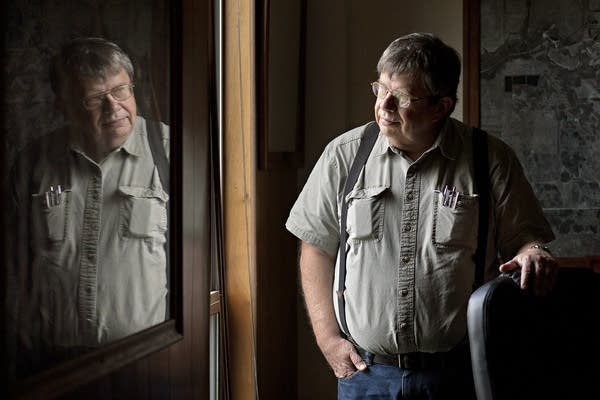Do you know where to vote?

Today is primary election day, so it's only right on the Update that we're leading with a lot of work on voting, politics, budgets and elections here in Minnesota and out on the campaign trail. We also have a mixed bag of national economic news and good news on Minnesota foreclosures. And there's a commentary on climate change, the drought, and "extreme" rainstorms.
It's primary Election Day
We'll be on the air and online, following the returns and the reaction from around Minnesota as voters choose the candidates who will appear on the general election ballot in November for each party. Jon Collins has a recap here of the contests, including races in the 1st and 8th Congressional Districts, 40 legislative seats across the state and nonpartisan races, including those for judicial, local and county offices. Secretary of State Mark Ritchie expects a turnout of less than 15 percent.
• Click here to locate your polling place.
• Bookmark this page to track election results.
Mankato joins opposition to marriage amendment
After hearing almost three hours of testimony, the Mankato City Council voted to oppose the proposed state constitutional amendment banning same-sex marriage. Sasha Aslanian reports that the vote was four in favor and two abstaining. Mankato Mayor Eric Anderson cast the only vote against the city council's resolution. After watching 11 cities pass resolutions opposing the amendment, The Minnesota Family Council has alerted its supporters of an upcoming vote in Roseville.
Create a More Connected Minnesota
MPR News is your trusted resource for the news you need. With your support, MPR News brings accessible, courageous journalism and authentic conversation to everyone - free of paywalls and barriers. Your gift makes a difference.
The price of safety
Tight budgets and changing attitudes are prompting rural Minnesota communities to find creative ways to save money without sacrificing public safety. One of those communities, the small northwestern Minnesota town of Fertile disbanded its police department more than 10 years ago. Then it dropped its contract maintained with the Polk County Sheriff's Office. Now, as Tom Robertson reports in part of our latest Ground Level series, some residents wonder whether doing away with local police was a good idea. Check out The Price of Safety by clicking here. And on a lighter note, have a look at the guard llamas of Park Rapids here.
The price of health insurance
At the the state level, budget hawks have found another way to save taxpayers some money by contracting with an outside consulting firm to audit the public employee health care insurance benefit roles. The result: About 3,100 people, roughly 4 percent of the 75,000 state employee dependents, were found to not be eligible for the health insurance they're been receiving. Tom Scheck reports that cutting those people from the roles could save the state about $10 million. Management and Budget officials are still compiling the data and say a full report on the audit will be released in the next month.
Automatic cuts loom in Washington
The purse strings are tightening in Washington: Sweeping, across-the-board spending cuts are due to strike Jan. 2 as punishment for the failure of last year's federal deficit supercommittee to reach a budget deal for achieving less red ink in the future. Fewer air traffic controllers, border guards, FBI agents and park rangers would be on the job as furloughs sweep across the government. Less meat might get inspected, and fewer people would get winter heating subsidies.
Retail sales are up
In economic news, the AP reports that U.S. retail sales rose in July by the largest amount in five months, buoyed by more spending on autos, furniture and clothing. All major categories showed increases, a sign that consumers may be gaining confidence after the longest stretch of declines since the fall of 2008. However, U.S. wholesale prices increased modestly in July from June. Food prices rose sharply, led by the biggest increase in corn prices in nearly six years.
But wholesale prices are up, too -- including corn
Those corn prices are driven by the drought, and part of the wholesale price news is that parched fields mean the U.S. corn harvest will fall to its lowest level in five years, even though of late there's been a bit of respite from the generally rainless summer. In the 18 states that grow most of the nation's corn, the USDA rated 51 percent of the crop as poor or very poor last week. Corn prices jumped 34.5 percent in July, the largest gain since Oct. 2006.
When it rains, it pours
In a commentary today, Ken Bradley of Environment Minnesota argues that drought, and 'extreme' rainstorms are further evidence of climate change: "Our report, entitled "When It Rains, It Pours," found that storms with heavy rain are happening 30 percent more frequently in Minnesota now than they were 65 years ago. In other words, an extreme rainstorm that used to hit Minnesota once every 12 months on average now occurs every 9.2 months on average."
Political fluff
The veepstakes drew a lot of attention yesterday, after Tim Pawlenty didn't get the call from Mitt Romney, and Paul Ryan was was elevated to a new, highly visible place on the GOP hustings. Today, Bob Collins casts a fresh eye on two related stories: The fluffy nature of network news "reporting" on a stakeout of Pawlenty's Eagan home; and what Collins calls an unfair hit by The Daily Show on the national press attempting to devine what Ryan's federal budget cutting could mean for average Americans. There's no fluff there, Collins insists.
